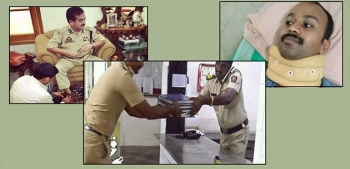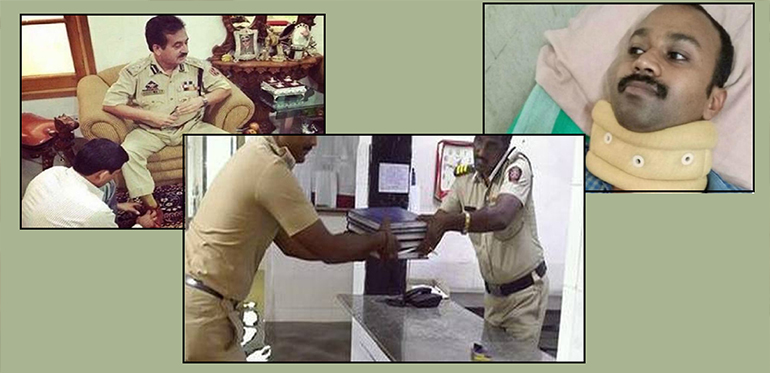
.png) Aarti
Aarti

The “orderly system” functional in police forces is quite discriminatory and reminiscent of British colonial era which affects the morale of the forces personnel who are trained to become security personnel, however are employed as cooks, drivers, attendants, etc.
Thanks to the Madras High Court’s recent directive to eradicate the feudal orderly system in Tamil Nadu Police. While the authorities have four months’ time to translate the order into action, the move, ostensibly is expected to boost the morale of such police personnel performing orderly duties.
Simply put, the very system of utilising the services of orderlies by a superior officer is believed to have come into existence during the British regime sometime in 1860s, when communication facilities were absent and the intent was to ensure that the services of police personnel were available for the officer to act quickly in case of any law-and-order problem. The practice continued even after independence although it has been abolished in many States.
Who are these orderlies? According to the Cambridge Dictionary, an orderly is a hospital worker who does jobs for which no training is necessary, such as helping the nurses or carrying heavy things. Oxford Dictionary defines orderly as a person who works in a hospital, usually doing jobs that do not need any special training or a soldier who does jobs that do not need any special training.
The term "orderly" does not find any place either in any enactments or rules but is mentioned in the Police Manual. The scale of orderlies prescribed in the Manual may vary from one State to another. For instance, typically, an Inspector General of Police is entitled to one Head Constable and 3 Constables. The Commissioner/Deputy Inspector General of Police – one Head Constable and 2 Constables. The Superintendent of Police and Police Officer of the corresponding rank - 3 Constables. Assistant/Deputy Superintendent of Police and Police officer of the corresponding rank - 2 Constables. Inspector, Reserve Inspector and Police Officer of the corresponding rank - one Constable.
According to the National Police Commission (NPC), constituted by the Union Government in 1977 to study the problems of police and submit a comprehensive review thereof, Constable orderlies are required to:- (i) attend to petitioners, complainants and other visitors who come to see the officer. (ii) attend to telephone calls, particularly during the officer's absence, and furnish helpful replies to enable the caller to speak to some other appropriate functionary for action. (iii) pass on messages on telephone to subordinate officers. (iv) carry messages and files from the officer to the local staff stationed nearby. (v) accompany the officer on his field work and be present with him to afford security and assistance in dealing with any situation. (vi) assist the officer in keeping his uniform and arms in a neat and smart condition. (vii) maintain the officer's reception room and office premises in a neat and tidy condition for receiving visitors and transacting official business.
In its First Report, tabled in the Parliament in 1980, NPC had noted that in the recent years there has been mounting criticism that the constabulary posted as orderlies to officers are misused for doing a lot of domestic chores and unauthorised personal work relating to the officers and his family like cooking, washing clothes, fetching grocery, etc. It is generally said that the constabulary are forced to perform orderly duties of this kind against their will and that they are not able to resist this exploitation in individual cases because of fear of vindictive reprisals in their regular official work. On the side of the police officers, as per NPC Report, it is argued that the orderly system provides an opportunity for the men serving in the lowest rung of the ladder to come into contact on an unofficial level with his commander and see him as a fellow human being. Such a relationship generates trust, respect and affection, apart from providing the availability of a trained constable to receive visitors, spot suspects, question them intelligently besides attending to telephone calls and generally acting as security assistant to the officer to whom he is attached. This close relationship with a member of the constabulary helps the officer also to have a perspective of the living and working conditions of the constabulary in general and provides him with a very useful channel of information on several matters relevant to the constabulary.
NPC recommended the abolition of the police orderly system, but however wanted the police officers to be assisted by a trained constable (to be called as security aide or by some other appropriate name) for official duties. To avoid misuse of the constabulary, NPC suggested payment of a suitable monthly allowance to the police officer for employing a private person of his choice to perform other duties.
The Second Administrative Reforms Commission as well the 6th Pay Commission in 2006 and 2008 respectively had recommended abolition of the orderly system.
In 2013, the Parliamentary Standing Committee (PSC) on Home Affairs headed by Mr M Venkaiah Naidu observed that the “orderly system” functional in police forces is quite discriminatory and reminiscent of British colonial era which affects the morale of the forces personnel who are trained to become security personnel, however are employed as cooks, drivers, attendants, etc. Recommending for the complete abolition of the orderly system, PSC maintained that posts of cooks, drivers, attendants, etc., if necessary, at the residences of senior officers of the forces should be sanctioned separately. In response to the PSC Report, the Ministry of Home Affairs informed that the practice of deployment of constable/follower security service in the Central Armed Police Forces has been stopped, therefore, these posts are no longer in existence. With regard to utilisation of service of security/force personnel at the residence of officer, it stated that the Forces have been asked to submit proposals for creation of Group C posts for deployment at the residences of the officers purely on the basis of operational requirement/justification.
Not long ago, a senior police officer in Kerala was in news for the wrong reasons after his daughter allegedly assaulted his driver, a police staffer, for reportedly being late to pick her from her morning walk. While the incident sparked public outrage and led to the transfer of the police officer, the Kerala Government is said to have initiated the process to dismantle the orderly system in the State.
In 2016, the orderly issue, as news reports indicate, gained momentum after constables threatened to go on mass leave in Karnataka, the State Government had to invoke the Essential Services Maintenance Act to dissuade them from going on leave. The next year, Karnataka, according to reports, abolished the orderly system.
The erstwhile unified Andhra Pradesh abolished the orderly system in 2009 in the wake of public outcry following the death of a Constable under mysterious circumstances while on duty as an orderly at the residence of a senior police officer.
Now back to the Tamil Nadu case.
Notably, the structural unconstitutionality, in the Police Department, prompted the Madras High Court to invoke the residuary relief clause in the writ prayer so as to deal with the same during the course of hearing of a petition from U Manickavel. He was a former Assistant Commissioner of Police who had challenged a notice served to him in 2014 to vacate the house allotted by the government.
The High Court was informed that several misconducts or offences of higher police officials of the Department were not responded to and no actions were being taken. Further, it was also submitted, that among others, the higher police officials still practised the orderly system in their residences and extracted household works from the uniformed police personnel, which was already abolished by the State Government in 1979.
The High Court also dwelt upon the usage of black film in the official vehicles by the higher officials of the police department, misuse of department's name in the private vehicles, abuse of police force in the name of orderly in their residences.
It was submitted by the State/Police that in the ongoing drive across Tamil Nadu, black films in 578 Police vehicles and POLICE' boards/Stickers in 8907 private vehicles had been removed so far. Further, 430 police personnel attached to senior officers who could have been utilized for domestic work had been withdrawn and asked to report to their parent unit for executive work. Higher officials serving in the Police Department including the Director General of Police submitted individual undertakings to the Court that none of the Police Personnel deployed on official duty like Security, Wireless operations at their residences are being employed in any other duty other than the official work assigned to them.
The main takeaways from the Court Order is that the practice of orderly system needs to be eradicated in entirety and within four months in accordance with the 1979 Government order by which the orderly system was abolished in the State of Tamil Nadu. An alternate arrangement for appointment of last grade government servant would have to be made in the places of orderlies at the scale admissible under the orders in force. Orderlies if deputed to the residence of the retired officials are to be withdrawn immediately. Enquiry needs to be conducted by the State/Police in the event of receiving any complaint or information as regard to the misconducts or offences from any person and initiate all appropriate actions under the relevant law. Illegal occupation of official police quarters will have to be identified and all steps to be initiated for eviction under the provisions of the Statute and the Rules in force.
The slew of directions issued by the Madras High Court will go a long way in boosting the morale of the constabulary and bring about transparency in the system. Digitisation of records related to allotment and vacation merits consideration as it can provide data on illegal occupation of government accommodation so as to initiate timely action in accordance with relevant rules.
Eradicating a colonial legacy like the orderly system is challenging but not impossible.